Презентация the-basic-structures-of-government




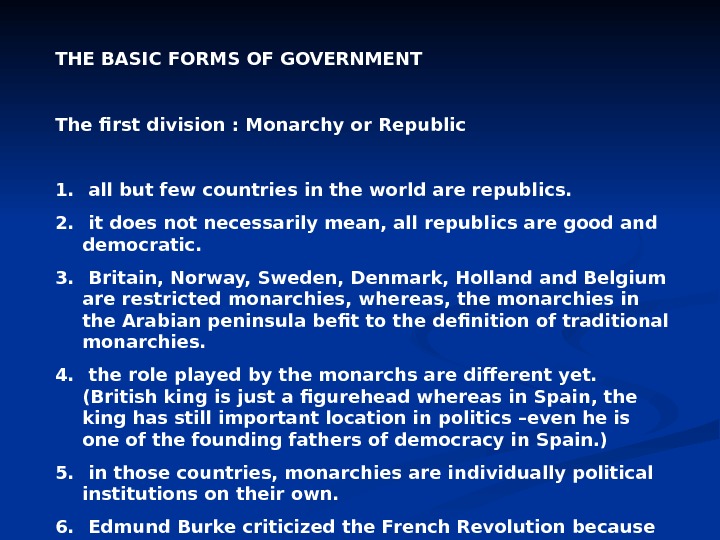
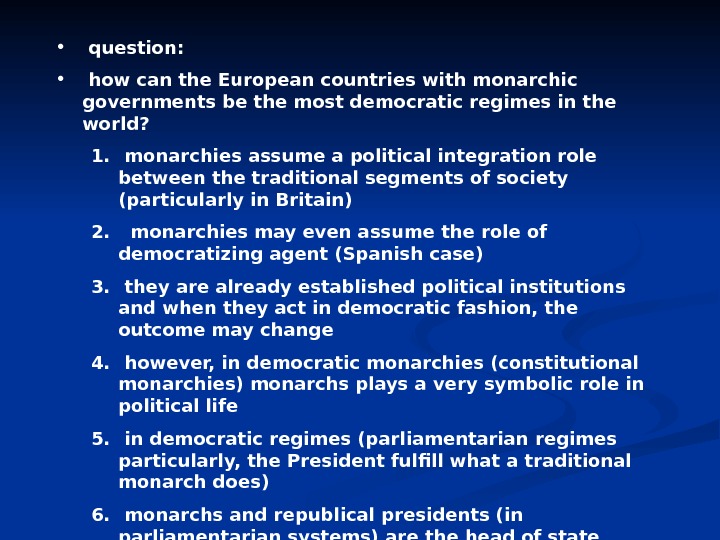



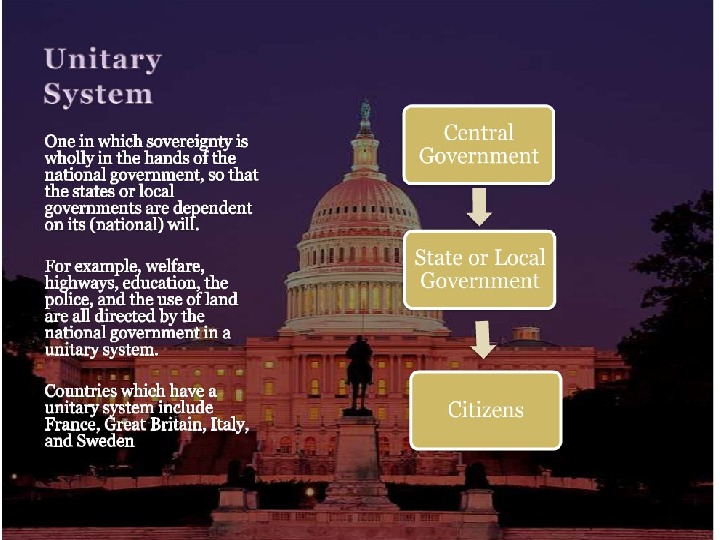

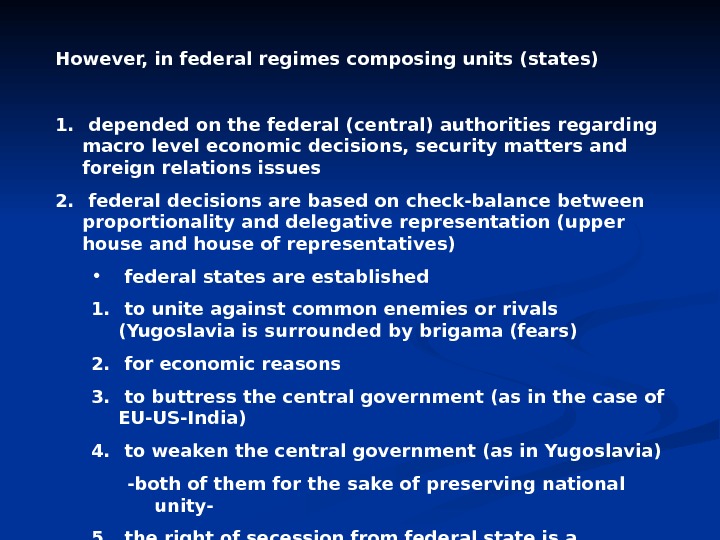









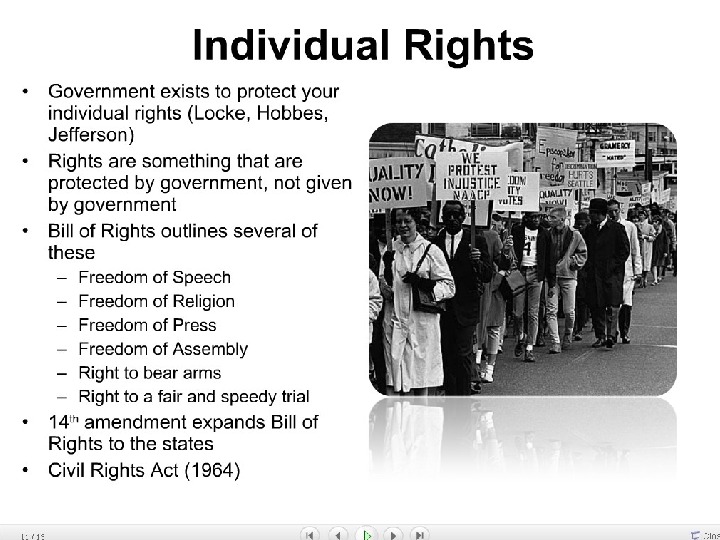

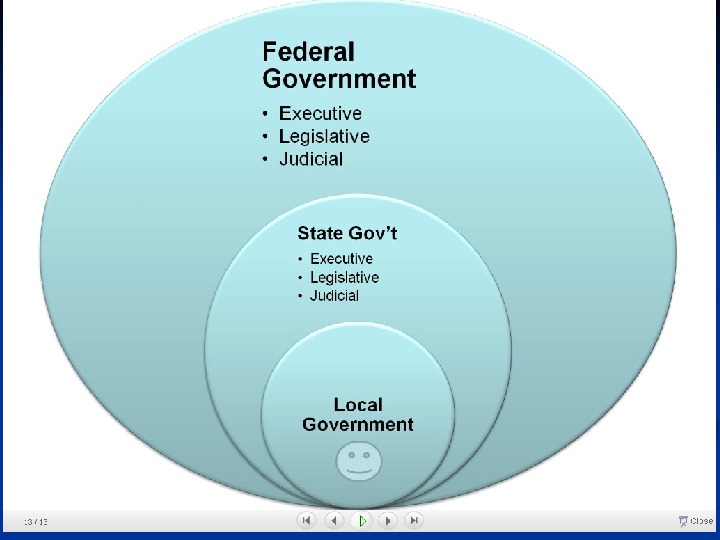
- Размер: 4.2 Mегабайта
- Количество слайдов: 23
Описание презентации Презентация the-basic-structures-of-government по слайдам
 THE BASIC STRUCTURES OF GOVERNMENT THE PLAN 1. discussion of political institutions 2. types of government 3. types of government by its actual examples
THE BASIC STRUCTURES OF GOVERNMENT THE PLAN 1. discussion of political institutions 2. types of government 3. types of government by its actual examples
 THE BASIC STRUCTURES OF GOVERNMENT Political institution: 1. it connotes flamboyant buildings representing the might of the state 2. they are also the things relevant to the established and durable relationships of power and authority (tangible and intangible) • Constitutional Court • National Security Council • constitution of the Republic of Turkey 3. division of pre-institutional and institutional • it relates to the method of politics • it relates to multi-level accountability 4. the problem of consolidation/institutionalization
THE BASIC STRUCTURES OF GOVERNMENT Political institution: 1. it connotes flamboyant buildings representing the might of the state 2. they are also the things relevant to the established and durable relationships of power and authority (tangible and intangible) • Constitutional Court • National Security Council • constitution of the Republic of Turkey 3. division of pre-institutional and institutional • it relates to the method of politics • it relates to multi-level accountability 4. the problem of consolidation/institutionalization
 THE BASIC STRUCTURES OF GOVERNMENT • the problem of consolidation/institutionalization 1. it is relevant to the codification (laws) 2. it erodes the role and influence of personal actors (although they might play a pivotal role in the emergence of political institutions) (Ataturk) 3. it is relevant to longitude (historical context) 4. it is relevant to the extent of internalization and accommodation (in the absentee of a clear codified rules) (co-habitation in France) 5. it is relevant to the usage of governmental power (by whom and until when) 6. hence it is relevant to the interruptedly continuation of government Question What does ‘consolidation of democracy’ mean?
THE BASIC STRUCTURES OF GOVERNMENT • the problem of consolidation/institutionalization 1. it is relevant to the codification (laws) 2. it erodes the role and influence of personal actors (although they might play a pivotal role in the emergence of political institutions) (Ataturk) 3. it is relevant to longitude (historical context) 4. it is relevant to the extent of internalization and accommodation (in the absentee of a clear codified rules) (co-habitation in France) 5. it is relevant to the usage of governmental power (by whom and until when) 6. hence it is relevant to the interruptedly continuation of government Question What does ‘consolidation of democracy’ mean?
 THE BASIC FORMS OF GOVERNMENT The first division : Monarchy or Republic 1. all but few countries in the world are republics. 2. it does not necessarily mean, all republics are good and democratic. 3. Britain, Norway, Sweden, Denmark, Holland Belgium are restricted monarchies, whereas, the monarchies in the Arabian peninsula befit to the definition of traditional monarchies. 4. the role played by the monarchs are different yet. (British king is just a figurehead whereas in Spain, the king has still important location in politics –even he is one of the founding fathers of democracy in Spain. ) 5. in those countries, monarchies are individually political institutions on their own. 6. Edmund Burke criticized the French Revolution because the French monarcy was a reliable political institution distilled through the history.
THE BASIC FORMS OF GOVERNMENT The first division : Monarchy or Republic 1. all but few countries in the world are republics. 2. it does not necessarily mean, all republics are good and democratic. 3. Britain, Norway, Sweden, Denmark, Holland Belgium are restricted monarchies, whereas, the monarchies in the Arabian peninsula befit to the definition of traditional monarchies. 4. the role played by the monarchs are different yet. (British king is just a figurehead whereas in Spain, the king has still important location in politics –even he is one of the founding fathers of democracy in Spain. ) 5. in those countries, monarchies are individually political institutions on their own. 6. Edmund Burke criticized the French Revolution because the French monarcy was a reliable political institution distilled through the history.
 • question: • how can the European countries with monarchic governments be the most democratic regimes in the world? 1. monarchies assume a political integration role between the traditional segments of society (particularly in Britain) 2. monarchies may even assume the role of democratizing agent (Spanish case) 3. they are already established political institutions and when they act in democratic fashion, the outcome may change 4. however, in democratic monarchies (constitutional monarchies) monarchs plays a very symbolic role in political life 5. in democratic regimes (parliamentarian regimes particularly, the President fulfill what a traditional monarch does) 6. monarchs and republical presidents (in parliamentarian systems) are the head of state, whereas Premiers are head of government 7. particularly, the third world suffers from the lack of deeply institutionalized political mechanisms or institutions themselves 8. the third world lacks some efficient means to consolidate democracy
• question: • how can the European countries with monarchic governments be the most democratic regimes in the world? 1. monarchies assume a political integration role between the traditional segments of society (particularly in Britain) 2. monarchies may even assume the role of democratizing agent (Spanish case) 3. they are already established political institutions and when they act in democratic fashion, the outcome may change 4. however, in democratic monarchies (constitutional monarchies) monarchs plays a very symbolic role in political life 5. in democratic regimes (parliamentarian regimes particularly, the President fulfill what a traditional monarch does) 6. monarchs and republical presidents (in parliamentarian systems) are the head of state, whereas Premiers are head of government 7. particularly, the third world suffers from the lack of deeply institutionalized political mechanisms or institutions themselves 8. the third world lacks some efficient means to consolidate democracy
 The second division : Unitary and Federal Systems 1. it is relevant to the territorial structuring of the nation • unitary system • highly centralized • its subdivisions (departments in France, provinces in Italy, counties in Sweden, vilayets in Turkey , prefectures in Japan ) are largely for administrative convenience • federal system • highly decentralized • its subdivisions are largely the representation of territorial division of political power (German lander, Swiss cantons, Yugoslavia Republics, US , Brazilian, Indian states) • confederation (highly loosed federation) • it is the highest decentralized system • it is so loosely formed that components (states, republics) can override the center (present Montenegro-Serbia or EU) • it tends to disintegrating or forming a more formidable federation)
The second division : Unitary and Federal Systems 1. it is relevant to the territorial structuring of the nation • unitary system • highly centralized • its subdivisions (departments in France, provinces in Italy, counties in Sweden, vilayets in Turkey , prefectures in Japan ) are largely for administrative convenience • federal system • highly decentralized • its subdivisions are largely the representation of territorial division of political power (German lander, Swiss cantons, Yugoslavia Republics, US , Brazilian, Indian states) • confederation (highly loosed federation) • it is the highest decentralized system • it is so loosely formed that components (states, republics) can override the center (present Montenegro-Serbia or EU) • it tends to disintegrating or forming a more formidable federation)
 UNITARY SYSTEMS 1. center exerts significant control over lo c al authorities • for instance, the scholl curricula is determined by the central ministry in Ankara 2. center has a national police force and control over local police force 3. the court system is also central, and body of laws are enforced in every part of the country 4. however, there are municipalities which assume some functions that the centre can not fulfill healthily, yet, they are still under firm scrutiny of the central government 5. on the other side, the trend is decentralization as much as possible
UNITARY SYSTEMS 1. center exerts significant control over lo c al authorities • for instance, the scholl curricula is determined by the central ministry in Ankara 2. center has a national police force and control over local police force 3. the court system is also central, and body of laws are enforced in every part of the country 4. however, there are municipalities which assume some functions that the centre can not fulfill healthily, yet, they are still under firm scrutiny of the central government 5. on the other side, the trend is decentralization as much as possible
 Cases of decentralization in unitary systems 1. devolution in Britain • as a response to the growing Scottish and Welsh nationalisms British parliament passed in 19 9 7 devolution bills endowing political power 2. decentralization in France • France has distinctive regional subcultures: the Celtic Bretons, the southerners of Midi, Corsicans • Paris govern the departments (provinces) through a appointed prefect (governer-vali) • In Mitterand era (1980 s), Paris endowed transferred some competences to those departments regarding local economic and financial affairs (thereby reversing about five century long centralization) 3. autonomy in Spain • Basque and Catalans regions are proud of their distinct cultures from Castillian majority (Euzkadi ta Askatasuna-ETA) demanded full independence to the Basque region • it is organized as ‘autonomies’ having rights to say in taxation matters, language and education through their own institutions (regional parliaments)
Cases of decentralization in unitary systems 1. devolution in Britain • as a response to the growing Scottish and Welsh nationalisms British parliament passed in 19 9 7 devolution bills endowing political power 2. decentralization in France • France has distinctive regional subcultures: the Celtic Bretons, the southerners of Midi, Corsicans • Paris govern the departments (provinces) through a appointed prefect (governer-vali) • In Mitterand era (1980 s), Paris endowed transferred some competences to those departments regarding local economic and financial affairs (thereby reversing about five century long centralization) 3. autonomy in Spain • Basque and Catalans regions are proud of their distinct cultures from Castillian majority (Euzkadi ta Askatasuna-ETA) demanded full independence to the Basque region • it is organized as ‘autonomies’ having rights to say in taxation matters, language and education through their own institutions (regional parliaments)

 FEDERAL SYSTEMS 1. in federalism, composing units have a specific degree (changing from regime to regime) political authority on the territorial basis 2. although USSR was a federal state, it was considerably different from other Western federal states like Germany or even from Yugoslavia 3. in a federal state composing units (states) have 1. their own constitution 2. their own body of law (accorded with the federal laws of course) 3. their own parliament, government and courts 4. their own parties (mostly offshots of federal level political parties) 5. their own local police forces (not army) 6. they are represented in federal bodies (generally bicameral parliaments) 7. their own rights regarding language and culture
FEDERAL SYSTEMS 1. in federalism, composing units have a specific degree (changing from regime to regime) political authority on the territorial basis 2. although USSR was a federal state, it was considerably different from other Western federal states like Germany or even from Yugoslavia 3. in a federal state composing units (states) have 1. their own constitution 2. their own body of law (accorded with the federal laws of course) 3. their own parliament, government and courts 4. their own parties (mostly offshots of federal level political parties) 5. their own local police forces (not army) 6. they are represented in federal bodies (generally bicameral parliaments) 7. their own rights regarding language and culture
 However, in federal regimes composing units (states) 1. depended on the federal (central) authorities regarding macro level economic decisions, security matters and foreign relations issues 2. federal decisions are based on check-balance between proportionality and delegative representation (upper house and house of representatives) • federal states are established 1. to unite against common enemies or rivals (Yugoslavia is surrounded by brigama (fears) 2. for economic reasons 3. to buttress the central government (as in the case of EU-US-India) 4. to weaken the central government (as in Yugoslavia) -both of them for the sake of preserving national unity- 5. the right of secession from federal state is a disputable matter
However, in federal regimes composing units (states) 1. depended on the federal (central) authorities regarding macro level economic decisions, security matters and foreign relations issues 2. federal decisions are based on check-balance between proportionality and delegative representation (upper house and house of representatives) • federal states are established 1. to unite against common enemies or rivals (Yugoslavia is surrounded by brigama (fears) 2. for economic reasons 3. to buttress the central government (as in the case of EU-US-India) 4. to weaken the central government (as in Yugoslavia) -both of them for the sake of preserving national unity- 5. the right of secession from federal state is a disputable matter













